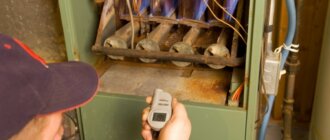Signs Your AC Has A Refrigerant Leak
Welcome to our blog post on the signs your AC has a refrigerant leak! As summer heats up, it’s crucial to ensure your air conditioning system is running smoothly.
One of the most important components of any AC unit is its refrigerant – a substance that cools and dehumidifies indoor air. However, if there’s a refrigerant leak in your HVAC system, it can lead to decreased cooling efficiency, higher energy bills, and potentially dangerous health risks.
In this article, we’ll investigate how you can tell if your AC has a refrigerant leak and what steps you should take next. Join us as we explore the world of AC maintenance and repair!
Understanding Refrigerant and Its Role in Your AC
Refrigerant is a chemical compound that plays a crucial role in the cooling process of your air conditioning unit. It is responsible for absorbing heat from indoor air and transferring it outside to provide cool air inside your home or office.
The refrigerant works by circulating through various components of the AC system, including the evaporator coils and condenser, where it undergoes phase changes between liquid and gas states. This allows it to absorb heat from warm indoor air and release it outside, creating a comfortable temperature indoors.
Without sufficient levels of refrigerant, your AC won’t be able to effectively remove heat from indoor air. This can lead to decreased cooling efficiency, higher energy bills, and potential damage to your unit over time.
It’s important to have regular maintenance performed on your AC system by qualified technicians who can check the refrigerant levels and ensure they are at optimal levels for efficient operation. By understanding how refrigerant works in your AC unit, you can better understand the importance of proper maintenance and repair when issues arise.
Signs Your AC Has a Refrigerant Leak
One of the most common issues that homeowners face with their air conditioning unit is a refrigerant leak. Refrigerant plays a crucial role in your AC system by absorbing heat from the indoor air and releasing it outside, which cools down your home. So if there’s a refrigerant leak, it can significantly affect the cooling efficiency and performance of your AC.
One of the primary signs that you have a refrigerant leak is decreased cooling efficiency. If you notice that some rooms in your house are warmer than usual or take longer to cool down, it might be due to insufficient refrigerant levels. Another sign is higher energy bills as your AC has to work harder to maintain the desired temperature when there’s low refrigerant.
If you see ice forming on your AC unit or hear hissing or bubbling noises coming from it, then those could also indicate a potential refrigerant leak issue. If warm air comes out of vents instead of cool air, then this could mean that there isn’t enough refrigerant flowing through the system.
It’s important to address these signs immediately because ignoring them can lead to more severe problems like compressor failure and increased risk for health hazards caused by mold growth in ductwork.
Decreased Cooling Efficiency
One of the most noticeable signs that your AC has a refrigerant leak is decreased cooling efficiency. This happens because refrigerant plays a crucial role in absorbing heat and releasing it outside, which allows your AC to cool down your home.
When there isn’t enough refrigerant due to a leak, your system will have to work harder and longer to achieve the desired temperature. As a result, you may notice that it takes longer for your home to cool down or that certain rooms are not being cooled at all.
Another reason why decreased cooling efficiency can occur is when ice accumulates on the evaporator coils. A lack of refrigerant can cause these coils to freeze over, making it impossible for them to absorb heat properly.
If you notice any decrease in cooling performance from your AC unit, it’s important not to ignore the issue. Not only can low levels of refrigerant lead to higher energy bills but also potential damage or even complete breakdowns of HVAC systems if left untreated.
Higher Energy Bills
One of the tell-tale signs that your AC has a refrigerant leak is higher energy bills. When your air conditioning system is low on refrigerant, it has to work harder and longer to cool your home, resulting in increased energy consumption and higher electricity bills.
You may not notice the increase in energy usage right away, but as the problem persists, you’ll start seeing a significant difference in your monthly utility costs. This can be frustrating for homeowners who are trying to keep their expenses under control.
If you’ve noticed an unexplained spike in your energy bills recently, it’s worth investigating whether there might be a refrigerant leak in your HVAC system. By fixing this issue promptly with professional AC maintenance or repair services, you could save yourself money on future utility bills while also preventing further damage to your air conditioner.
It’s important to note that simply adding more refrigerant won’t solve the problem of high energy usage caused by leaks. In fact, doing so could even make matters worse by causing additional strain on other components of the AC system and increasing potential health risks from exposure to refrigerants that leak into indoor spaces.
Ice on the AC Unit
One of the most apparent signs that your AC has a refrigerant leak is ice on the unit itself. When there isn’t enough refrigerant in the system, it can cause coils to freeze up and create a layer of ice around them.
This happens because the lack of refrigerant makes it difficult for heat to be absorbed from inside your home. Without proper absorption, moisture accumulates on the evaporator coil and freezes over time.
If left untreated, this issue can lead to severe damage to your AC unit. The build-up of ice can put extra strain on internal components and cause them to malfunction or break down altogether.
Not only does this result in costly repairs, but it also means more energy consumption as your AC struggles to keep up with demand while running inefficiently. So if you notice any ice formation on your air conditioner’s external surface or indoor units, don’t hesitate – call an HVAC professional right away!
Hissing or Bubbling Noise
One of the most noticeable signs of a refrigerant leak in your air conditioning unit is hissing or bubbling noise. If you hear these sounds coming from your AC, it may be due to the refrigerant escaping through small holes or cracks in the system.
The reason behind this sound is that as the refrigerant escapes, it moves at high pressure and speed through narrow openings. This causes vibrations and turbulence, which produces a distinct hissing or bubbling sound.
If left untreated, this can lead to further damage to your AC system and pose potential health risks. So if you hear any unusual noises coming from your AC unit, it’s best to call an HVAC professional immediately for repair services.
Ignoring such sounds can cause significant harm not only to your air conditioning unit but also to yourself and your family members. Therefore regular maintenance checks are highly recommended by experts as they can help detect any issues before they turn into major problems.
Warm Air from Vents
Have you ever noticed warm air blowing out of your AC vents during the summer months? This could be a sign that your AC has a refrigerant leak. When there is insufficient refrigerant in the system, it can’t cool the air properly and as a result, warmer air is circulated throughout your home.
It’s important to note that warm air from vents can also be caused by other issues such as dirty filters or blocked ducts. However, if you have checked these factors and still experience warm air coming from your AC unit, then it’s best to call an HVAC professional to inspect for possible leaks.
Ignoring this issue may lead to more serious problems down the line including damage to your AC compressor or even a full breakdown of the entire system. Not only will this cost you money on repairs but it will also increase energy bills due to inefficient cooling.
If you notice any unusual changes in airflow or temperature coming from your AC unit, it’s always better to err on the side of caution and schedule an inspection with an HVAC technician right away.
Dangers and Implications of a Refrigerant Leak
A refrigerant leak in your air conditioning system can have numerous dangers and implications. It is important to understand these risks so that you can take the necessary steps to prevent them.
One of the most significant implications of a refrigerant leak is its environmental impact. Refrigerants are harmful chemicals that can deplete the ozone layer and contribute to climate change. When released into the atmosphere, they can also harm plants and animals.
In addition, a refrigerant leak can cause serious damage to your AC system over time. As refrigerant levels decrease, your compressor may have to work harder, leading to increased wear and tear on components.
Moreover, if left unchecked, a refrigerant leak could lead to health risks for you and your family. Exposure to high levels of refrigerants could cause headaches, dizziness, nausea, or even asphyxiation in extreme cases.
Therefore it’s essential that you address any suspected leaks immediately by calling an HVAC professional who will identify the location of the leaking area before repairing it properly using appropriate techniques such as welding or brazing, which helps protect our environment while keeping us safe from further health risks down the road.
Environmental Impact of Refrigerant Leaks
Refrigerant leaks from air conditioning units can have a significant impact on the environment. Refrigerants are potent greenhouse gases that contribute to global warming and climate change. When they leak into the atmosphere, they can cause harm to both human health and the environment.
Studies have shown that refrigerant leaks account for a significant portion of total emissions of greenhouse gases. These emissions trap heat in the Earth’s atmosphere, leading to rising temperatures and other negative effects such as sea-level rise, extreme weather events, and more.
Furthermore, refrigerants can deplete the ozone layer when released into the atmosphere. The depletion of this protective layer allows harmful ultraviolet radiation from the sun to reach Earth’s surface at higher levels than normal levels.
Releasing refrigerants into our environment also poses a threat to wildlife and ecosystems. These substances are toxic when ingested by animals or absorbed by plants, resulting in adverse effects on their health.
It is crucial for homeowners with AC systems to be aware of any potential refrigerant leaks within their unit because it not only affects energy consumption but also contributes significantly towards environmental degradation. Regular maintenance checks should be scheduled with HVAC professionals who can detect these kinds of issues early enough before causing further damage or endangering lives around us.
Potential Harm to the AC System
A refrigerant leak in your AC system can cause potential harm to the entire unit. The refrigerant is an essential component that helps to cool the air inside your home, and without it, the AC cannot work effectively.
When there’s a leak in the refrigerant line, it puts undue stress on other parts of the AC system. The compressor has to work harder than usual to compensate for the loss of coolant, which can lead to overheating and eventually breakdown.
In addition to this, when there’s not enough refrigerant circulating through your AC, it results in less cooling power. This means you’ll have warm air blowing into your home instead of cool air during hot summer months.
Furthermore, low levels of coolant may also cause ice buildup on different parts of your AC system leading them towards damage or sometimes failure.
It’s crucial always to address any signs indicating a possible refrigerant leak as quickly as possible before more serious problems occur. Regular maintenance by qualified technicians will help prevent leaks from happening and keep your HVAC running at peak performance all year round.
Health Risks
When it comes to refrigerant leaks, health risks are a serious concern. Refrigerants contain chemicals that can be harmful if inhaled or exposed to skin and eyes. The most common symptoms of exposure include headaches, dizziness, nausea, and irritation of the throat and eyes.
In addition to immediate symptoms, long-term exposure can also lead to more severe health problems such as heart damage and respiratory issues. It’s important to note that the elderly, children, and those with pre-existing conditions may be more susceptible to the effects of refrigerant exposure.
If you suspect your AC has a refrigerant leak, it’s crucial to take action immediately for both your safety and health. Avoid inhaling any fumes from the leaking refrigerant by turning off your AC unit until a professional can inspect it.
Remember that prevention is key when it comes to avoiding potential health risks associated with HVAC systems. Regular maintenance by licensed professionals can help detect any potential leaks early on before they become hazardous.
What to Do If Your AC Has a Refrigerant Leak
If you suspect that your AC has a refrigerant leak, it’s important to take immediate action. Ignoring the issue can lead to further damage and higher repair costs.
The first step is to turn off your air conditioning unit and call a professional HVAC technician. Attempting to fix the leak yourself can be dangerous and may cause more harm than good.
When the technician arrives, they will inspect your AC system for any signs of leaks and determine if there is a need for refrigerant recharge or replacement. They may also check other parts of the system like valves, coils, or lines that could be damaged or malfunctioning.
It’s important to note that simply adding more refrigerant without finding and repairing the leak won’t solve the problem in most cases. Your technician will locate and fix the source of the problem before recharging/refilling with new refrigerant.
After repairs are complete, make sure to maintain regular maintenance on your AC unit by scheduling annual tune-ups with a professional HVAC company. This will help prevent future leaks from occurring while ensuring maximum efficiency from your cooling system.
Steps to Take When You Suspect a Refrigerant Leak
If you suspect a refrigerant leak in your AC, it’s essential to take immediate action. Ignoring the issue can lead to severe consequences that may result in expensive repairs or even replacement of the entire system.
The first step is to turn off your AC and unplug it from its power source. This will prevent any further damage from occurring as well as keep you safe while attempting to diagnose the problem.
Next, locate the condenser unit outside and check for any visible signs of a leak, such as oil spots or bubbles on the refrigerant lines.
You can also use a leak detector tool to identify where exactly the refrigerant is leaking from. Once you have located the source of the leak, call in an HVAC professional immediately for repair services.
It’s essential not to attempt DIY repairs without proper training or experience since handling refrigerants can be dangerous and require specialized tools.
Remember that regular maintenance checks by certified technicians can help prevent leaks before they occur. Therefore, scheduling routine AC maintenance should be part of every homeowner’s HVAC care plan.
Preventing Refrigerant Leaks
Preventing refrigerant leaks is essential in maintaining the efficiency and longevity of your AC unit. Regular maintenance by a professional HVAC technician can help prevent leaks from occurring. They will check for any signs of wear and tear on your system’s components, including the refrigerant lines.
Another way to prevent refrigerant leaks is by ensuring proper installation. If an AC unit is not installed correctly, it could cause damage to the refrigerant lines or other parts of the system, leading to a leak.
Regularly changing air filters can also help prevent refrigerant leaks as dirty filters can cause stress on the compressor, which can lead to leakage.
It’s important not to add more refrigerant without first identifying and repairing any existing leaks. Overcharging your system with additional coolant will only exacerbate the issue, leading to further damage down the line.
Avoid DIY repairs when it comes to your AC unit. Attempting repairs without proper training or knowledge may result in further damage that leads to costly replacements down the line. Trusting professionals with regular maintenance and repair work is key in preventing future issues such as refrigerant leaks.
Conclusion
A refrigerant leak is a serious issue that can lead to decreased cooling efficiency, higher energy bills, and potential harm to your AC system. It’s important to be aware of the signs of a refrigerant leak so you can take action quickly. If you suspect your AC has a refrigerant leak, it’s best to contact an HVAC professional who can diagnose and repair the problem.
Remember that regular maintenance on your AC unit can help prevent refrigerant leaks from occurring in the first place. Keep an eye on your energy bills and listen for any unusual noises coming from your AC unit. By being proactive about maintaining your AC system, you’ll not only save money but also ensure that it continues to provide reliable cooling throughout the summer months.
Recent Queries:



